2018 Hessian state election
The 2018 Hessian state election was held on 28 October 2018 to elect the members of the Landtag of Hesse.[1] The incumbent coalition government of the Christian Democratic Union (CDU) and The Greens led by Minister-President Volker Bouffier retained its majority by a slim margin of one seat.
| |||||||||||||||||||||||||||||||||||||||||||||||||||||||||||||||||||||||||||||
All 137 seats of the Landtag of Hesse, including 27 overhang and leveling seats 69 seats needed for a majority | |||||||||||||||||||||||||||||||||||||||||||||||||||||||||||||||||||||||||||||
|---|---|---|---|---|---|---|---|---|---|---|---|---|---|---|---|---|---|---|---|---|---|---|---|---|---|---|---|---|---|---|---|---|---|---|---|---|---|---|---|---|---|---|---|---|---|---|---|---|---|---|---|---|---|---|---|---|---|---|---|---|---|---|---|---|---|---|---|---|---|---|---|---|---|---|---|---|---|
| Turnout | 2,882,261 (67.3%) | ||||||||||||||||||||||||||||||||||||||||||||||||||||||||||||||||||||||||||||
| |||||||||||||||||||||||||||||||||||||||||||||||||||||||||||||||||||||||||||||
| |||||||||||||||||||||||||||||||||||||||||||||||||||||||||||||||||||||||||||||
The election was held two weeks after the 2018 Bavarian state election, which saw the CDU and Social Democratic Party (SPD) suffer major losses, with third parties making major gains. The result in Hesse was largely similar, with the CDU and SPD losing more than 20 percentage points between them, while the Greens and Alternative for Germany (AfD) gained approximately 9 points each. The Free Democratic Party (FDP) and The Left also made gains. Compared to the 2013 election turnout fell by 5.9 points to 67.3%.[2]
Despite suffering the worst losses of any party, the CDU remained the largest party by a comfortable margin. The Greens and SPD each won 29 seats and 19.8% of the vote; the Greens moved into second place by an extremely narrow margin of just 66 votes. AfD, which failed to win seats in 2013, won 13.1% and 19 seats. By entering the Landtag in Hesse, it became the only third party present in all sixteen German state legislatures.
The election was overshadowed by the poor condition of the federal government in the aftermath of the "asylum quarrel" in June/July and the crisis around Hans-Georg Maaßen in September.[3][4] One day after the election, federal Chancellor Angela Merkel announced that she would not seek re-election as CDU leader at the party convention in early December, nor seek her party's nomination as Chancellor candidate for the next federal election.[5]
Background
The incumbent Hesse government coalition consisted of CDU and the Greens.
The regional election for Hesse, along with the Bavarian state election held just two weeks before, was widely seen as a test for the ruling CDU/CSU and SPD coalition of Angela Merkel's fourth federal cabinet.[6]
Parties
The table below lists parties represented in the previous Landtag of Hesse.
| Name | Ideology | Leader(s) | 2013 result | |||
|---|---|---|---|---|---|---|
| Votes (%) | Seats | |||||
| CDU | Christian Democratic Union of Germany Christlich Demokratische Union Deutschlands |
Christian democracy | Volker Bouffier | 38.3% | 47 / 110 | |
| SPD | Social Democratic Party of Germany Sozialdemokratische Partei Deutschlands |
Social democracy | Thorsten Schäfer-Gümbel | 30.7% | 37 / 110 | |
| Grüne | Alliance 90/The Greens Bündnis 90/Die Grünen |
Green politics | Tarek Al-Wazir Priska Hinz |
11.1% | 14 / 110 | |
| Linke | The Left Die Linke |
Democratic socialism | Janine Wissler Jan Schalauske |
5.2% | 6 / 110 | |
| FDP | Free Democratic Party Freie Demokratische Partei |
Classical liberalism | René Rock | 5.0% | 6 / 110 | |
Opinion polling
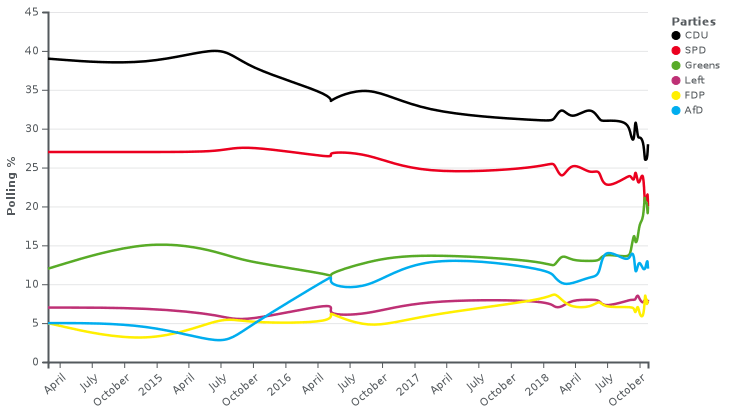
| Polling firm | Fieldwork date | Sample size |
CDU | SPD | Grüne | Linke | FDP | AfD | Others | Lead |
|---|---|---|---|---|---|---|---|---|---|---|
| 2018 state election | 28 Oct 2018 | – | 27.0 | 19.8 | 19.8 | 6.3 | 7.5 | 13.1 | 6.5 | 7.2 |
| Forschungsgruppe Wahlen | 24–25 Oct 2018 | 1,025 | 28 | 20 | 20 | 8 | 8 | 12 | 4 | 8 |
| Civey | 18–24 Oct 2018 | 4,467 | 27.0 | 22.0 | 18.5 | 7.5 | 8.0 | 13.0 | 4.0 | 5.0 |
| INSA | 18–22 Oct 2018 | 1,004 | 26 | 21 | 21 | 8 | 7 | 13 | 4 | 5 |
| Infratest dimap | 16–17 Oct 2018 | 1,002 | 26 | 21 | 20 | 8 | 9 | 12 | 4 | 5 |
| Forschungsgruppe Wahlen | 15–17 Oct 2018 | 1,035 | 26 | 20 | 22 | 8 | 8 | 12 | 4 | 4 |
| Civey | 2–12 Oct 2018 | 4,549 | 28.5 | 24.9 | 18.2 | 7.5 | 5.6 | 11.8 | 3.5 | 3.6 |
| Forschungsgruppe Wahlen | 24 Sep–1 Oct 2018 | 1,038 | 29 | 23 | 18 | 8 | 6 | 13 | 3 | 6 |
| Civey | 19–26 Sep 2018 | 4,509 | 28.6 | 23.0 | 15.8 | 8.8 | 7.6 | 12.4 | 3.8 | 5.6 |
| Forschungsgruppe Wahlen | 17–19 Sep 2018 | 1,039 | 32 | 25 | 15 | 8 | 6 | 11 | 3 | 7 |
| Infratest dimap | 13–19 Sep 2018 | 1,000 | 28 | 23 | 17 | 8 | 7 | 14 | 3 | 5 |
| INSA | 3–6 Sep 2018 | 1,039 | 29 | 24 | 14 | 8 | 7 | 14 | 4 | 5 |
| Civey | 14–30 Aug 2018 | 4,532 | 31.1 | 23.9 | 13.4 | 7.9 | 7.1 | 12.7 | 3.9 | 7.2 |
| Infratest dimap | 14–19 Jun 2018 | 1,003 | 31 | 22 | 14 | 7 | 7 | 15 | 4 | 9 |
| Forschungsgruppe Wahlen | 4–11 Jun 2018 | 1,049 | 31 | 25 | 13 | 8 | 8 | 11 | 4 | 6 |
| INSA | 9–16 May 2018 | 1,067 | 33 | 24 | 13 | 8 | 7 | 11 | 4 | 9 |
| Forschungsgruppe Wahlen | 19–21 Mar 2018 | 1,011 | 31 | 26 | 13 | 8 | 7 | 10 | 5 | 5 |
| Allensbach | 19 Dec 2017–31 Jan 2018 | 760 | 31 | 26 | 12 | 7 | 9 | 11 | ? | 5 |
| Forsa | 8–22 Feb 2018 | 1,035 | 33 | 23 | 14 | 7 | 8 | 10 | 5 | 10 |
| Infratest dimap | 9–16 Jan 2018 | 1,006 | 31 | 25 | 13 | 8 | 8 | 12 | 3 | 6 |
| 2017 federal election | 24 Sep 2017 | – | 30.9 | 23.5 | 9.7 | 8.1 | 11.5 | 11.9 | 4.4 | 7.3 |
| Infratest dimap | 5–10 Jan 2017 | 1,003 | 32 | 24 | 14 | 8 | 6 | 14 | 2 | 8 |
| dimap | 15–22 Aug 2016 | 1,000 | 36 | 27 | 13 | 6 | 4 | 9 | 5 | 9 |
| Forsa | 1–8 Apr 2016 | 1,004 | 33 | 27 | 11 | 6 | 7 | 10 | 6 | 6 |
| Infratest dimap | 12–16 Jan 2016 | 1,000 | 34 | 26 | 11 | 8 | 5 | 12 | 4 | 8 |
| Forsa | 17–26 Aug 2015 | 1,009 | 38 | 28 | 13 | 5 | 5 | 4 | 7 | 14 |
| dimap | 6–13 Jul 2015 | 1,003 | 41 | 27 | 14 | 6 | 6 | 2 | 4 | 14 |
| dimap | 10–14 Dec 2014 | 1,000 | 38 | 27 | 16 | 7 | 2 | 5 | 5 | 11 |
| 2014 European election | 25 May 2014 | – | 30.6 | 30.3 | 12.9 | 5.6 | 4.1 | 9.1 | 7.3 | 0.3 |
| Forsa | 18–27 Feb 2014 | 1,002 | 39 | 27 | 12 | 7 | 5 | 5 | 5 | 12 |
| 2013 federal election | 22 Sep 2013 | – | 39.2 | 28.8 | 9.9 | 6.0 | 5.6 | 5.6 | 4.9 | 10.4 |
| 2013 state election | 22 Sep 2013 | – | 38.3 | 30.7 | 11.1 | 5.2 | 5.0 | 4.1 | 5.6 | 7.6 |
Results
Summary of the 28 October 2018 final election results for the Hessian Landtag[2]
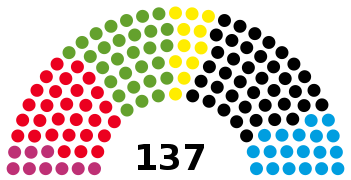 | |||||||||||||||
| Party | Constituency | Party list | Total seats | ||||||||||||
|---|---|---|---|---|---|---|---|---|---|---|---|---|---|---|---|
| Votes | % | +/− | Seats | +/− | Votes | % | +/− | Seats | +/− | Seats | +/− | % | |||
| Christian Democratic Union (CDU) | 843,068 | 29.3% | −13.4 | 40 | −1 | 776,910 | 27.0% | −11.3 | 0 | −6 | 40 | −7 | 29.2% | ||
| Alliance '90/The Greens (Grünen) | 517,904 | 18.0% | +8.7 | 5 | +5 | 570,512 | 19.8% | +8.7 | 24 | +10 | 29 | +15 | 21.2% | ||
| Social Democratic Party (SPD) | 670,637 | 23.3% | −11.8 | 10 | −4 | 570,446 | 19.8% | −10.9 | 19 | −4 | 29 | −8 | 21.2% | ||
| Alternative for Germany (AfD) | 362,210 | 12.6% | +11.2 | 0 | 378,692 | 13.1% | +9.0 | 19 | +19 | 19 | +9 | 13.9% | |||
| Free Democratic Party (FDP) | 205,384 | 7.1% | +4.1 | 0 | 215,946 | 7.5% | +2.5 | 11 | +5 | 11 | +5 | 8.0% | |||
| The Left (Die Linke) | 164,535 | 5.7% | +0.5 | 0 | 181,332 | 6.3% | +1.1 | 9 | +3 | 9 | +3 | 6.6% | |||
| Others | 109,332 | 4.0% | ±0 | 0 | ±0 | 187,423 | 6.5% | ±0 | 0 | ±0 | 0 | ±0 | 0% | ||
| Total | 2,873,070 | 100.0% | 55 | 2,881,261 | 100.0% | 82 | 137 | +27 | 100% | ||||||
State government formation
Despite heavy losses inflicted on the party, the CDU returned to government after negotiating a coalition agreement with the Greens, the second consecutive such arrangement between the two parties. The two parties formed the narrowest possible majority in the Landtag, occupying 69 seats. As part of the agreement, the Greens increased their representation in the Cabinet, holding four of the eleven portfolios.[7] The returned coalition only became possible after a recount of votes took place several weeks after the election, due to computer glitches which affected some election night results. Following the recount, the state election commissioner announced that compared to the provisional figures, there were no significant shifts in the percentages, and the distribution of seats in the state parliament had not changed.[8]
References
- http://www.wahlrecht.de/termine.htm#termine-2018-01-23
- https://statistik-hessen.de/l_2018/html/landesergebnis Official result
- Was die Hessenwahl für die Bundespolitik bedeutet, Frankfurter Allgemeine, 28 October 2018
- Schicksalswahl für Merkels Koalition, Frankfurter Allgemeine, 26 October 2018
- Angela Merkel bietet Verzicht auf Parteivorsitz an, Die Zeit, 29 October 2018
- "Hesse election: Merkel facing double trouble in German vote". BBC News. 26 October 2018. Retrieved 28 October 2018.
- "How the unlikely team of CDU and Greens have reunited in Hesse". The Local. 20 December 2018.
- "Merkel's CDU and Greens can breathe sigh of relief after Hesse vote recount". The Local. 16 November 2018.
External links
![]()
- Hessischer Landeswahlleiter (Official website, German language)
- Wahlumfragen zur Landtagswahl in Hessen (wahlrecht.de)
- KOALITIONSVERTRAG (Text of the CDU/Greens Coalition Agreement, German)
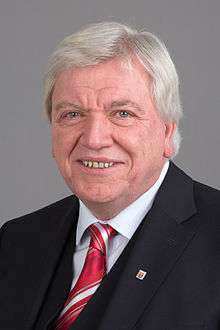
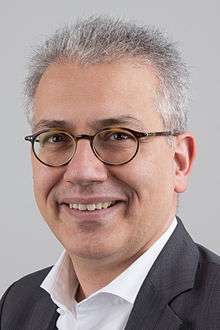

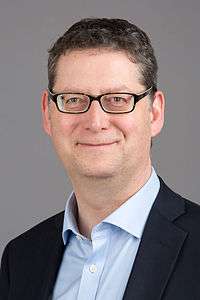
.jpg)
.jpg)
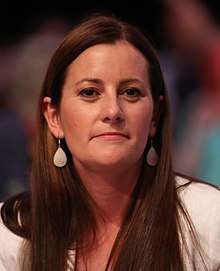
.jpg)